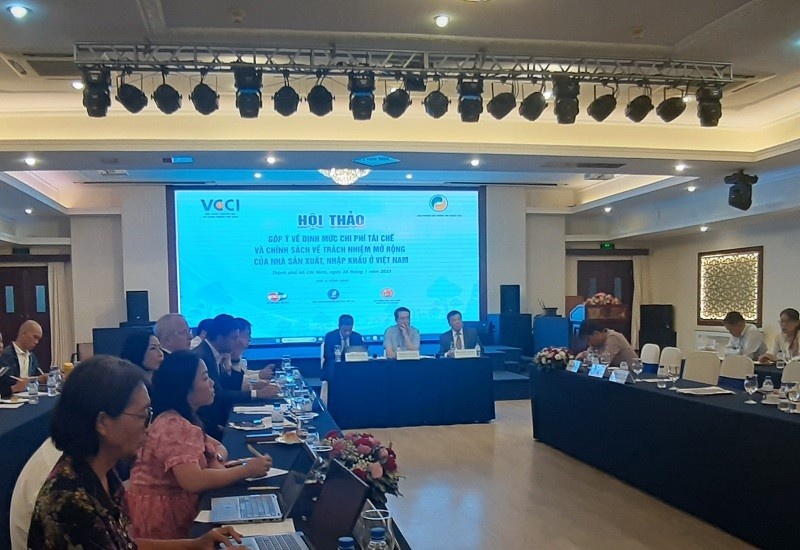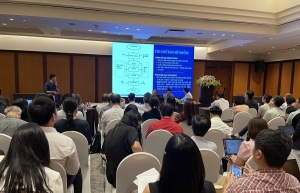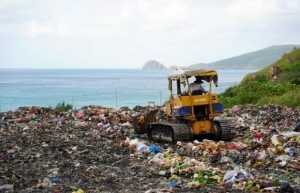Manufacturers may pay more than $259 million per year in recycling costs
 |
Dau Anh Tuan, deputy secretary general of the Vietnam Chamber of Commerce and Industry (VCCI), spoke at a meeting on July 28 regarding recycling costs and extended liabilities in Vietnam, saying "It is not feasible for manufacturers and importers to carry out their responsibilities efficiently without proper recycling cost norms."
The draft on recycling cost norms, which was drafted on the basis of Article 54 of the 2020 Law on Environmental Protection, proposed by the National Extended Producer Responsibility (EPR) Council specifies, "The norm of recycling costs for a unit volume of product, packaging, and administrative costs for management, supports the implementation of product and packaging recycling responsibilities and the responsibility of manufacturers and importers for waste collection and treatment."
Phan Tuan Hung, director of the Legal Department under the Ministry of Natural Resources and Environment, and permanent member of the National EPR Council, stated, "The oversight of recycling duties and extended responsibilities for manufacturers and exports will motivate enterprises to manufacture and export products of higher quality, reducing emissions of single-use materials, and lead to the execution of the government's commitments to minimise emissions."
Currently, the Vietnam Beer, Wine, and Beverage Association, the Vietnam Plastic Association (VPA), and the Food and Foodstuff Association Ho Chi Minh City, are extremely concerned about the recycling cost coefficient in their respective industries. The belief is that the draft remains excessive and unreasonable, as the coefficient is greater than that of countries in Western Europe, with aluminium 1.26 times higher and glass 2.12 times higher.
According to the calculations of these associations, businesses will be required to pay an estimated $259 million per year in recycling fees, excluding fees for the three primary categories of packaging, namely paper, plastic, and metal. This is a tremendous expense that will cause a great deal of difficulty for businesses and increase product prices, particularly given the current economic climate.
The general secretary of the VPA, Huynh Thi My, stated that Vietnam's plastic recycling industry has just entered its infancy and is confronting many challenges. In 2022, Vietnam consumed 9.2 million tonnes of plastic materials, 38 per cent of which was used for packaging.
According to My, the plastic packaging industry is a processing industry with basic and straightforward technology, resulting in the very low profit margin of approximately 5 per cent. "Under the proposed recycling cost standards, the recycling contribution will account for nearly 40 per cent of the company's profits. Low interest rates and significant contributions will cause a recession in the plastics industry," she said.
 | Businesses recoil at high recycling costs While domestic and foreign-invested enterprises welcome the calculation of reasonable and valid recycling cost for packaging, they are seeking flexible application and supporting policies to ensure sustainable development. |
 | EPR fees to add to plastic companies' bills Although the Environmental Producer Responsibility (EPR) scheme could create an incentive for the phase-out of eco-unfriendly and non-recyclable packaging in the long term, it would shift the heavy financial burden for end-of-life waste management from municipalities to producers and importers. |
 | Clearing up issues related to recycling costs Many foreign-invested producers are concerned about the high recycling costs, which could create a significant financial burden for their businesses and potentially lead to increased product prices for consumers. Being a representative for the policy marker parties, I would like to clarify some basis for building the formula to help the business community have clear knowledge on this issue. |
What the stars mean:
★ Poor ★ ★ Promising ★★★ Good ★★★★ Very good ★★★★★ Exceptional
Related Contents
Latest News
More News
- Ho Chi Minh City hits $8.37 billion in FDI (December 29, 2025 | 08:28)
- Tax sector wraps up 2025 and sets priorities for next year (December 25, 2025 | 14:00)
- Heavy industries set for pilot greenhouse gas quotas (December 25, 2025 | 10:00)
- $250 million deal targets women-owned SMEs, sustainable agriculture (December 22, 2025 | 17:40)
- UOB sees Vietnam growth easing in fourth quarter (December 22, 2025 | 17:39)
- Government moves to establish International Financial Centre (December 21, 2025 | 21:00)
- Vietnam's IFC to target global investment flows (December 21, 2025 | 18:00)
- Ha Tinh breaks ground on major Vingroup industrial and energy projects (December 19, 2025 | 18:24)
- EVN launches major power infrastructure projects nationwide (December 19, 2025 | 18:17)
- VAL inaugurates second production line to meet domestic animal feed demand (December 19, 2025 | 16:37)

 Tag:
Tag:





















 Mobile Version
Mobile Version